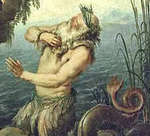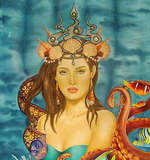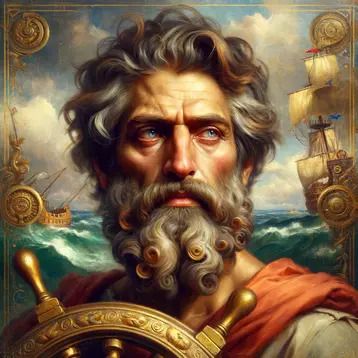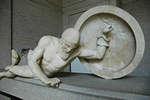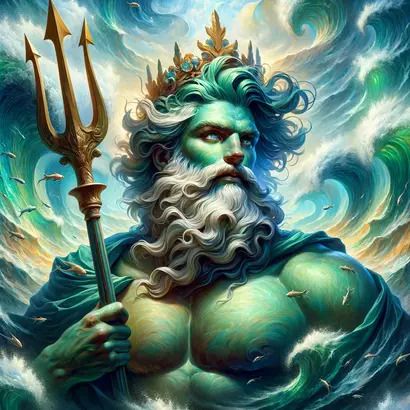
Poseidon
🔱 Poseidon :: Greek God of the Sea
Poseidon is the violent and ill-tempered god of the sea. One of the Twelve Olympians, he was also feared as the provoker of earthquakes and worshipped as the creator of the horse. A hot-blooded deity, Poseidon had many disputes with both gods and men, most famously with Athena and Odysseus.
Poseidon’s Role
Poseidon's Name
Poseidon’s name is very old, and its meaning is lost to us. Various authors have tried to translate it as either “husband of the earth” or “lord of the waters.” Plato says that it means “knower of many things,” but this is much less likely.
Poseidon's Portrayal and Symbolism
Poseidon is nowadays known exclusively as a sea god, but in ancient times, he may have been the god of the earth and fertility or even the supreme god of the sky. In fact, in portrayals, he looks very much like Zeus, a distinguished, bearded man with a dense curly hair and piercing eyes. Homer says that his shriek was as loud as one of ten thousand men combined.
Oftentimes, he is depicted riding a four-horse chariot and wielding a trident over the waves. The trident is his most recognizable emblem, though his son, Triton, carries one as well. It is said that Poseidon struck a rock with his trident to create the very first horse, Skyphios. During the Gigantomachy, the god used the trident to break off a piece of the island Kos, under which he subsequently entombed the Giant Polybotes. This piece became today’s island Nisyros.
Poseidon's Epithets
Since Poseidon had multiple powers, the Ancient Greeks invented various epithets to describe his manifestations and pray to him. To some, he was the “Savior of Sailors,” to others the “Averter of Earthquakes.” Yet a third group venerated him as “The Creator and Tamer of Horses” and to a fourth one he was “The Leader of Nymphs.”
Poseidon's Family
Poseidon was the second son of Cronus and Rhea (after Hades) and their penultimate child (before Zeus). Hestia, Demeter, and Hera were his sisters.
Like all of his siblings aside from Zeus, Poseidon was swallowed by Cronus at birth and, thanks to Zeus, afterward disgorged unharmed.
However, some say that Rhea managed to hide Poseidon from his father’s rage as well – either in a flock of lambs in Arcadia or in Rhodes to be raised by Oceanus’ daughter Capheira and the Telchines.
Disputes with Other Gods and Men
Poseidon Challenges Zeus
Poseidon had a very violent character, Impulsive and hot-blooded, he couldn’t put up with Zeus’ arrogant behavior as a ruler. So, he teamed up with Hera and Athena to teach him a lesson. However, with the help of Thetis and Briareus, Zeus overpowered his challengers.
Poseidon, Laomedon, and the Trojans
As punishment, he sent Poseidon and Apollo to serve the Trojan king Laomedon, for whom they built the vast, beautiful walls surrounding Troy. However, when the time came, Laomedon refused to pay them. As a result, Poseidon – even against the advice of Zeus – fought on the Greek side during the Trojan war, sending a sea monster named Cetus to torment the Trojans.
Poseidon, the Greeks, and Odysseus
Even so, the narcissist that he was, Poseidon destroyed the fortifications built by the Greeks, firmly believing that his walls are the only buildings of the type worthy to remain. And, mad at him for blinding his son Polyphemus, he had a decade-long feud with one of the greatest Greek heroes, Odysseus.
Poseidon and Athena
The god of the sea was also greedy – especially when it came to earthly kingdoms. Once, he even wanted to obtain Athens from Athena, claiming that the city would have much more benefit from him than her. To prove this, he struck his trident into a rock, creating a seawater stream which welled up in the Temple of Erechtheion on the north side of the Acropolis. Athena, in turn, planted an olive tree. Cecrops, the first king of Athens, decided that Athena’s gift was more useful since it gave fruit, wood, and oil. Athena kept Athens, and ever since then, the olive branch is a universal symbol of peace.
Poseidon’s Women and Children
Just like Zeus, Poseidon had a weak spot for women. And, much like him, he was not exactly loved back by them. However, what he couldn’t acquire with romance and gentleness, he did with violence and craftiness.
Caeneus and Medusa
For example, he took by force both Caeneus and Medusa, who was afterward transformed into a beast by Athena as a punishment for allowing this. After Perseus beheaded the pregnant monster, Medusa gave birth to Poseidon’s children, Chrysaor and Pegasus.
Demeter, Amymone, and Aethra
To trick Demeter who turned into a mare to reject his advances, the god transformed himself into a stallion. Afterward, Demeter gave birth to the nymph Despoena and the talking horse Arion. With Amymone, Poseidon fathered Nauplius; with Aethra – the divine hero Theseus. The list goes on and includes hundreds of consorts and at least as many children.
Poseidon and Amphitrite
Amphitrite, a Nereid, was Poseidon’s faithful wife throughout. She didn’t want it at the beginning, though. In fact, she fled to the Atlas Mountains to escape the god of the sea. However, Poseidon sent Delphinus to win her. Honey-tongued Delphinus did the job in flying colors. As a favor, Poseidon set his image among the star: the constellation Dolphin.
Amphitrite bore Poseidon three children: Triton, Rhode, and Benthesikyme.
Poseidon: Myths and Hidden Truths
One common misconception about Poseidon is that he was solely a vengeful and cruel god, only bringing destruction and chaos. While he was indeed known for his temper and his capacity for violence, Poseidon also played a vital role in maintaining the balance of the seas and was considered the protector of sailors and fishermen.
Additionally, some people mistakenly believe that Poseidon was responsible for all natural disasters, including storms and earthquakes. While he was indeed associated with these phenomena, the ancient Greeks understood that other gods and forces of nature also contributed to such events.
Poseidon and Horses
A lesser-known fact about Poseidon is his association with horses and horsemanship. Often referred to as the "tamer of horses," the god is credited with creating the first horse, Skyphios, by striking a rock with his trident. This connection highlights another aspect of his power and influence over the natural world, extending far beyond the oceans and seas.
Poseidon and Atlantis
Another intriguing fact about Poseidon is his link to the ancient city of Atlantis. According to the philosopher Plato, Poseidon was the founder and patron deity of this legendary island, which was said to be a utopian society of great power and wealth. The myth of Atlantis serves as a testament to Poseidon's enduring influence in the realm of ancient Greek mythology, as well as his connection to ideas of power, wealth, and the mysteries of the deep sea.
Poseidon: Unraveling the Sea God's Turbulent Nature
In our journey through the mythology of Poseidon, we've experienced the turbulent nature of this powerful god. We've been captivated by his fierce temperament and the awe-inspiring stories of his disputes with both gods and mortals. As we delved into the depths of his complex personality, we could almost feel the intensity of the waves crashing against the shores and the rumbling of the earth beneath our feet.
For us, the most intriguing aspect of Poseidon's mythology lies in his relentless pursuit of power and his insatiable desire for control. In a way, his character serves as a reminder of the relentless and unpredictable forces of nature, instilling both admiration and caution in our hearts.
Poseidon Sources
Learn some of the epithets the Ancient Greeks invented for Poseidon in the very brief 22nd Homeric Hymn. Or have a laugh or two with Lucian, while reading his modern-sounding “Dialogues of the Sea-Gods.” Naturally, most of them include Poseidon.
See Also: Nereus, Amphitrite, Odysseus, Laomedon
Poseidon Video
Poseidon Q&A
Poseidon Associations
Link/Cite Poseidon Page
Written by: The Editors of GreekMythology.com. GreekMythology.com editors write, review and revise subject areas in which they have extensive knowledge based on their working experience or advanced studies.
For MLA style citation use: GreekMythology.com, The Editors of Website. "Poseidon". GreekMythology.com Website, 19 Apr. 2023, https://www.greekmythology.com/Olympians/Poseidon/poseidon.html. Accessed 27 April 2024.

